*Reading for this week: ‘Walking the Edge of the Stage in Theory; Or, Janet Cardiff’s Sensorium for
Intermedial Bodies’ (Camen, 2012)[1] Derkson – Walking the Edge
I didn’t read the article properly but I can refer to the term ‘mind space’ the article suggests as this space one creates by listening to an audio performance piece and being in a particular space and time. I would to elaborate on that in my next post, after giving it more thought.
*Assignment 1: Complete at least half of the ‘Everyday Moments’ series. [2]
This is from Fuel Theatre’s website: “Everyday Moments, 2011. We have commissioned a series of podcasts created especially for you to enjoy at a particular time and place. Imagine there was a soundtrack to those small moments when you find yourself alone, brushing your teeth, in the bath, watching the rain stream down your living room window, or when you’re tucked up in bed unable to sleep. Artists making the podcasts with us were: Bobby Baker, Inua Ellams, Nic Green, John Hegley, Kazuko Hohki, Adrian Howells, Josie Long, Peggy Shaw, Hofesh Shechter, Lemn Sissay, Nick Whitfield and Melanie Wilson. One podcast a month was released throughout 2011. “
I started doing this performance on Thursday, February 11th. First, I had to download all the audio files to my ‘Soundcloud’ application on my phone. I had to be very organised so I added the different times and places I needed to do listen to these audio files in to my calendar. While I was downloading the files I listened to ‘Everyday Moments 12: any old time when the shops are open, driving on a flyover, searching for Christmas presents by Bobby Baker’. I couldn’t properly listen to this one because it wasn’t the right time or place I was ordered to be while I’m listening. It was late in the evening and I was all alone in the university’s library .i was immediately drown to the time and place the audio piece was recorded. It was strange and somehow an uncanny and liminal place but I was there. The sounds from the recording and from outside mixed to a singular and particular experience I was the only one to experience. This liminal space or the ‘mind space’ that was created by me, the present I’m living and the recording was about to accompanied me throughout the whole experience. I was really scares of not following the rules after that. What if I’m not going to obey to the specific time and place rules the artist ordered me to be while listening? Will it ruin the whole experience?
The first podcast in the series is entitled ‘In the Evening, In the Bath’, and it is by Kazuko Hohki. I didn’t listened to do that one, simply because I had no excess to a bath. I didn’t realise I don’t have a bath and how sad is the fact that I have to take all my showers standing. I was fortunate enough to have the ability to choose between taking a bath or a shower all my life in parents’ house and I guess it’s a thing now, an issue or something that is also contributing to the proses of reshaping my identity here.
The second one is by the poet Inua Ellams and is designed to be heard on a city bridge, at midnight, with a pen and paper – and some friends. I was planning on doing that on Friday but I was too tired to go out of the warm and cosy bed at midnight. I tried to tell myself every evening since to try and do it but it just didn’t happen.
The third audio piece is by poet and comedian John Hegley, and is meant to be heard on a Saturday morning, as you’re doing jobs around the house. I listened to that on the morning of the 13th. It was lovely! I really enjoyed it! I felt not so lonely anymore and like I’m sharing my life with someone. This feeling was so vivid and didn’t feel like this someone who is with me lives in a virtual space and time as it really is. I felt like when I’m obeying the rules I get a fuller experience and It is not alienating me.
The fourth podcast is by the performance artist Peggy Shaw, and is meant to be heard at dawn, at home, after a sleepless night. I couldn’t afford myself to have a sleepless night. I had to work and had a lot of university tasks to complete. I know that sleepless nights are part of the everyday life and I promised myself that once ill have one I’ll listen to that podcast. The duration of the performance is undetermined and I in this freedom I feel like the piece is living with me at all time. I can go back to it and explore it again and again as it keep penetrating my own life and elevate them from their everydayness.
The fifth podcast is by choreographer Hofesh Shechter, and is meant to be heard late at night, with headphones, in a completely dark room – with some space to move. Hofesh Shechter has an Israeli accent that gave me a feeling of comfort and homecoming and it felt a lot easier to give in to his instructions. As a person who don’t really like the dark it gave me a sense of something to rely on. So I gave myself in immediately. It was very late at night and I was alone in my room in complete darkness. This is what I wrote to myself right after the track ended: “wow! It was such a journey! I cried. It was scary and reassuring at the same time. It’s the best one for me because it’s very activating. I can’t do it by myself. I have to share this experience”.
The power of that mind space it created was very strong and I decided to do it again and video record my reaction. As a tool of developing my abilities as an artist and explore the different ways of activating an audience.
The sixth podcast is by Nic Green, and is designed to be heard at sunrise, outside, on top of a hill. I meant to listen to this and to the eights podcast, by Josie Long, to be listened to at 5.30pm in an express supermarket and never succeeded in dragging myself outside at five am, just by myself.
Number seven in the series is by film-maker Nick Whitfield, and is designed to be listened to first thing in the morning, with a cup of coffee, as an excuse to delay starting work. I meant to be cheeky and do it in the morning of the third session and actually use it as an excuse to be late but I’m not brave enough. Instead I did it the morning before and used it as an excuse to myself to be late to the time I set to myself to come to the library. I’m surprised by how I lost my rebel spirit.
At the end of the recording it says that its 1600 and it’s pretend. I felt betrayed. The whole podcast was very plain and ‘everyday’ but that ending broke the ‘forth wall’ and I was very confused. Can you break the rules in a performance that requires taking so much responsibility from its audience? That opened for me a new route of thinking.
The ninth podcast is the first one I listened to, officially and it’s by Melanie Wilson, to be listened to in the bathroom in the evening with the door closed and standing in front of the mirror. Facing the mirror is forcing you to deal with yourself, all alone, just for the sake of staring and examining yourself. I didn’t feel comfortable doing it although its something I’m doing every day. To frame it in this limits of performative action was taking me out of my comfort zone. The memory that was described in the podcast scared me for being so close to my own memories and having this great similarity to my own story. And maybe it’s universal memory and such a common human experience. Is it the best hyper realism? By inserting the audience into the convention?
The next one, number ten, I couldn’t do. It was by Lemn Sissay and meant to be listened during a late night rain. It wasn’t raining at all (surprisingly!) so nature didn’t let me do it.
The last one,11, is by Adrian Howells and is designed to be listened to in the early hours of the morning, in bed with a hot drink. And so I did. The sound effects made feel very cold and I was surprised by the power it has over me. The noises from the recording and the outside got mixed up in my mind and it made feel really lonely and sad. I just needed to call my mum and tell her that but I didn’t have the words to explain it. It remained wordless inside of me.
To sum up this whole experience I can say I’ve learned a lot about the power of the mind space the artist can create for its audience, and the power of word in creating reality. Abracadabra is in Aramaic, which is one of the origins of modern days Hebrew and can be translated to I will create what I am saying. And this going to be the name of my performance for this module. I will create reality or history with just what I’m saying. I hope to develop this idea further.
*Assignment 2: “Exhibiting the city: to curate and present (…) a material or virtual exhibition of at least 8-10 of the following…” [3] (attachment 2;exhibition task0
I tried to curate more than create in this assignment in order to explore more on this term. I’m living in Lincoln since last summer and I’ve already established a certain pattern between three dots on my individual map and that can be formatted into a triangle: homeàuniversityàwork. This Lincoln as far as I know because this is my Lincoln. I used a laundry wire to form a triangle that would represent my Lincoln between those three dots because I wanted to hang my ‘dirty laundry’ on it, to air it out. All the not so nice things I’ve done in certain places, those places are now charged with my history. Hanging laundry is a very domestic action and this is one way of trying to call this place home. I walked around in all this places and tool pictures of them from my point of view, as I’ve seen them when the actual events happened. Walking around it opened the door to a conversation, storytelling and sharing histories in a playful way and nonformal. I’m attaching a few pictures from the installation itself and performative action of hanging the pictures.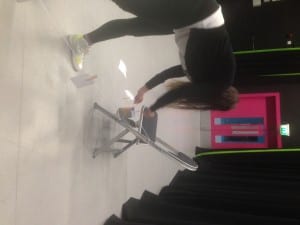
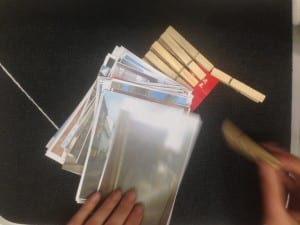
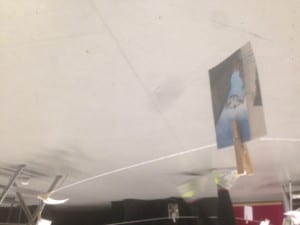
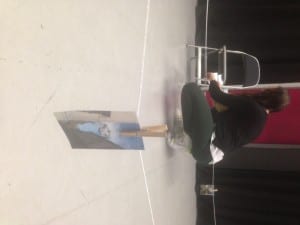
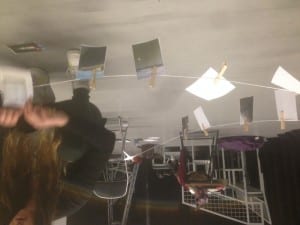
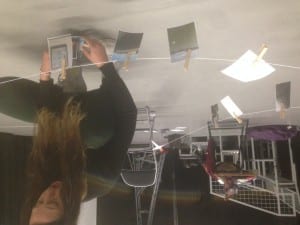
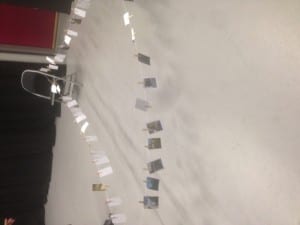
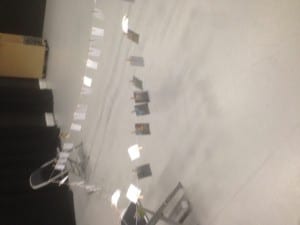
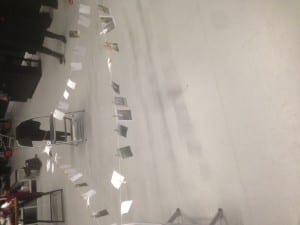
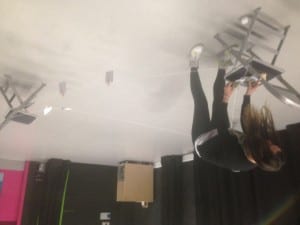
Im inviting you to ask questions about it and how it matches the criteria I was given. Be part of the performance!
*the images used for the installation, curated during the performance. exhibiton pix
[1] Derkson, Camen (2012) ‘Walking the Edge of the Stage in Theory; Or, Janet Cardiff’s Sensorium for
Intermedial Bodies’ in Theatre Research in Canada. 33.1 pp 1-23
[2] http://fueltheatre.com/projects/everyday- moments
[3] From the file I was handed in class. (i.e 2nd attachment)
